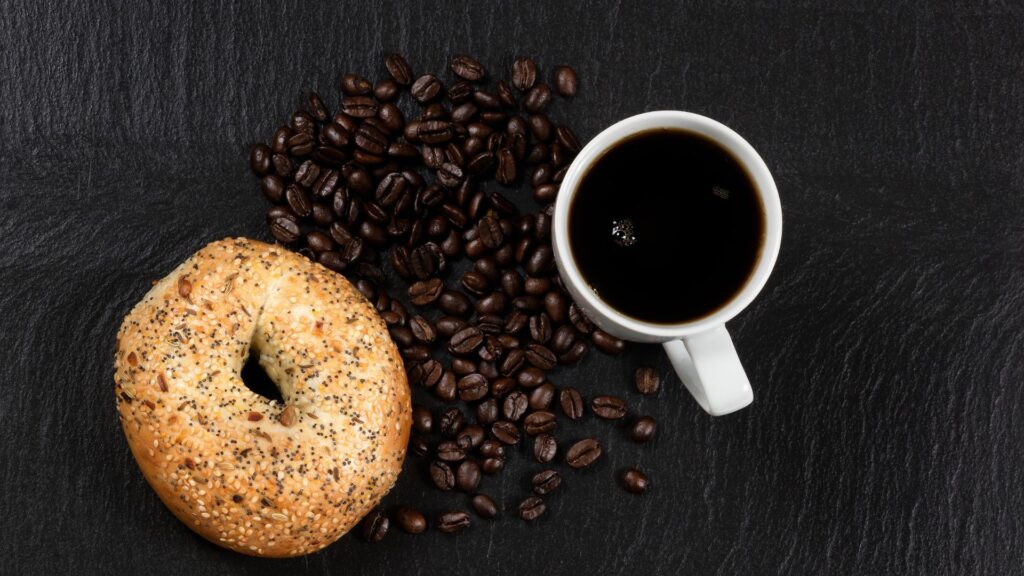In the realm of diet and nutrition, coffee often emerges as a subject of debate, oscillating between being vilified and celebrated. However, recent trends and research have increasingly highlighted its role in enhancing diet plans, particularly for weight loss and overall wellness. Central to this paradigm shift is the concept of the coffee diet, a unique approach that integrates coffee consumption with a focus on whole foods, while consciously limiting processed foods and calorie intake.
The Coffee Lover’s Diet: A Revolutionary Perspective
The coffee diet gained significant traction and simplified understanding through Dr. Bob Arnot’s influential book, “The Coffee Lover’s Diet.” This groundbreaking guide revolutionized the way we perceive coffee’s role in our diet. Contrary to the longstanding belief that coffee could be detrimental to health, Dr. Arnot’s work unveiled the potential of coffee to be, when consumed properly, one of the healthiest and most enjoyable aspects of our daily routine. His book does more than just suggest coffee as a diet supplement; it presents a comprehensive lifestyle approach where coffee is central to achieving improved health, longevity, mental clarity, and weight loss.
The Dual-Edged Sword of Coffee Consumption
While the coffee diet has been praised for its potential benefits, it’s crucial to approach it with a balanced understanding. One of the key aspects to consider is the risk of weight regain, a common challenge in many diet plans, which might also be a concern in a coffee-centric diet. Additionally, the high amounts of caffeine, a defining attribute of coffee, come with their own set of potential side effects. These can range from mild discomforts like jitteriness to more significant issues in individuals sensitive to caffeine or those with certain health conditions.
In essence, the introduction of coffee into diet plans is not just about adding a beverage to one’s routine. It’s about understanding and harnessing the multifaceted benefits of coffee while being mindful of its potential drawbacks. This requires a nuanced approach, one that appreciates coffee not just for its taste and stimulating effects, but also for its broader impact on health and well-being.
In the following sections, we will delve deeper into the various aspects of incorporating coffee into diet plans, exploring the benefits and considerations that come with this approach, and how it can be effectively integrated into a lifestyle aimed at achieving and maintaining optimal health.
Understanding the Coffee Diet

At its core, the coffee diet is a nutritional approach that combines the consumption of coffee with a diet rich in whole foods, while minimizing the intake of processed foods and excessive calories. This diet isn’t just about drinking coffee; it’s about incorporating coffee into a balanced and health-focused eating plan. The philosophy behind this diet is to leverage the natural properties of coffee to enhance overall health and facilitate weight loss.
Coffee as a Catalyst for Health and Weight Loss
Dr. Bob Arnot’s book, “The Coffee Lover’s Diet,” presents coffee as a catalyst for improved health and weight loss. This approach is based on the premise that coffee, when consumed in a structured manner, can contribute positively to one’s health regime. Coffee is rich in antioxidants and other compounds that can boost metabolism, increase energy levels, and even enhance mental clarity. These properties make it a valuable addition to a weight loss diet.
Navigating the Risks: Weight Regain and Caffeine Intake
One of the challenges associated with the coffee diet, as with many other diet plans, is the risk of weight regain after the initial loss. This is often due to the body’s adaptation to the reduced calorie intake and potential changes in metabolic rates. Furthermore, the high caffeine content in coffee, while beneficial in moderation, can lead to side effects such as insomnia, nervousness, restlessness, and in some cases, more serious health issues in caffeine-sensitive individuals. Therefore, it’s crucial to approach the coffee diet with a balanced perspective, understanding one’s own body’s responses to caffeine and adjusting the intake accordingly.
Coffee Diet Plans in Practice: Balancing Coffee with Nutritional Needs
Implementing the coffee diet effectively requires more than just adding several cups of coffee to your daily routine. It involves a thoughtful integration of coffee into a well-rounded diet. This means pairing your coffee consumption with a diet rich in fruits, vegetables, lean proteins, and whole grains. It also means being mindful of the calorie content and nutritional value of the foods you consume alongside your coffee. The goal is to create a harmonious balance where coffee complements your nutritional intake, rather than dominating it.
Tailoring the Coffee Diet to Individual Preferences and Health Goals
The beauty of the coffee diet lies in its flexibility and adaptability to individual preferences and health goals. Whether you prefer a light roast with its higher antioxidant levels or a dark roast with its deeper flavor, the coffee diet can be tailored to suit individual tastes while still reaping the health benefits. It’s also adaptable in terms of caffeine sensitivity; decaffeinated options can be a part of this diet for those who are sensitive to caffeine or wish to limit their intake.
In summary, the coffee diet presents an innovative approach to weight loss and health, emphasizing the beneficial properties of coffee while promoting a diet rich in whole, unprocessed foods. By understanding and respecting the potential risks and tailoring the diet to one’s individual needs and preferences, it can be a sustainable and enjoyable way to enhance overall health and well-being. In the next sections, we will explore the specific benefits that coffee can offer in the context of weight loss and general health.
Benefits of Coffee for Weight Loss

Intensified Energy
The most immediate benefit of incorporating coffee into a diet plan is the significant boost in energy levels it provides. This is primarily due to caffeine, a natural stimulant that increases alertness and reduces feelings of tiredness. The energy surge from coffee can be instrumental in enhancing physical performance, making it easier to engage in more rigorous and prolonged workouts, which are crucial for weight loss. Furthermore, the heightened energy levels can improve overall productivity and encourage more active lifestyle choices, such as opting for stairs instead of elevators or engaging in more physical activities during leisure time.
Appetite Suppression
Coffee is known to have appetite-suppressing properties, which can be a valuable aid in weight management. The presence of certain compounds like chlorogenic acid in coffee may influence hunger hormones and delay the sensation of hunger. This can lead to a reduction in overall calorie intake, as individuals may find themselves less inclined to snack or overeat. However, it’s important to use this benefit wisely and ensure that reduced food intake does not compromise nutritional needs.
Improved Metabolism
One of the key components in weight loss is the body’s metabolic rate, and coffee is known to have a thermogenic effect, meaning it helps increase metabolism. The caffeine in coffee can stimulate the metabolic rate, leading to more calories being burned throughout the day. This metabolic boost not only aids in weight loss but can also contribute to the prevention of weight gain, making it a valuable tool for weight maintenance as well.
Enhanced Focus and Concentration
Coffee’s impact on mental clarity and focus is another aspect that can indirectly contribute to weight loss. A heightened state of mental alertness and improved concentration can be beneficial for maintaining consistency in dietary choices and exercise routines. This mental sharpness can lead to better decision-making regarding food choices and more disciplined adherence to workout schedules.
Antioxidant Benefits
Coffee is a rich source of antioxidants, which play a significant role in overall health. These antioxidants, including chlorogenic acid and caffeic acid, can help combat oxidative stress and reduce inflammation in the body. This is not only beneficial for general health but can also aid in weight loss by improving body function and potentially enhancing fat metabolism.
Physiological Effects
Beyond its metabolism-boosting and appetite-suppressing effects, coffee can influence several physiological processes. Caffeine stimulates the central nervous system, enhancing mood, improving overall well-being, and potentially reducing the risk of depression. This positive impact on mental health can be a crucial factor in maintaining motivation and commitment to a weight loss journey.
The benefits of coffee in the context of a diet plan are manifold, ranging from increased energy and improved metabolism to enhanced mental function and antioxidant protection. However, these benefits must be balanced with mindful consumption and an understanding of one’s personal health and caffeine tolerance. In the following section, we will explore the various coffee combinations and their specific contributions to weight loss, providing insights into how best to incorporate these into a comprehensive diet plan.
Coffee Combinations for Weight Loss
Incorporating coffee into a weight loss regimen can go beyond the traditional black cup. There are various blends and combinations that not only enhance the flavor but also boost the weight loss benefits. Each of these special blends has unique properties that can aid in achieving specific health and weight loss goals.
Green Tea & Coffee
Combining the benefits of green tea and coffee creates a powerful blend for weight loss. Green tea is renowned for its high antioxidant content, particularly catechins, which, when combined with caffeine, can enhance fat burning and boost metabolism. The Green Tea & Coffee blend is not only less bitter than regular coffee but also brings together the comforting qualities of coffee with the health benefits of green tea. This blend is perfect for those who want to enjoy the taste of coffee while capitalizing on the additional metabolic benefits of green tea.
Low Acid Coffee
For individuals with sensitive stomachs or those prone to acid reflux, low acid coffee can be a game-changer. Regular coffee’s high acidity can sometimes lead to gastrointestinal discomfort, but low acid varieties reduce this risk. These coffees are processed in ways that lower their acid content, making them gentler on the stomach while retaining the beneficial antioxidants and metabolism-boosting effects. This makes low acid coffee an excellent option for those who want the benefits of coffee without the acidic side effects.
Keto Coffee
Keto coffee, often referred to as “Bulletproof Coffee,” is a blend that includes ingredients like MCT (Medium Chain Triglycerides) oil and grass-fed butter. This combination not only aligns with the high-fat, low-carbohydrate ketogenic diet but also helps in suppressing appetite and boosting energy levels. The healthy fats in keto coffee can provide sustained energy without the crash often associated with high-carb meals, making it a popular choice for those on a ketogenic diet or those looking to decrease their carbohydrate intake.
Unroasted Green Beans Coffee
Green coffee, made from unroasted coffee beans, is another excellent option for weight loss. These beans contain higher levels of chlorogenic acid compared to regular, roasted coffee beans. Chlorogenic acid is believed to have health benefits for heart disease, diabetes, weight loss, and others. Green coffee not only maintains the basic qualities of regular coffee but may also offer additional benefits in terms of appetite control and metabolic enhancement.
Ginseng Coffee
Ginseng coffee is a blend that combines the benefits of ginseng with traditional coffee. Ginseng is known for its energy-boosting and metabolism-enhancing properties. When combined with coffee, it can help in improving physical performance, reducing fatigue, and possibly aiding in weight loss. Ginseng coffee often includes additional ingredients like Garcinia Cambogia and a B vitamin complex, further supporting weight loss efforts.
Each of these coffee combinations offers unique benefits that can be integrated into a weight loss plan. They cater to different preferences and dietary needs, providing options for almost everyone. Choosing the right type of coffee blend can enhance the effectiveness of a diet plan, making the journey towards weight loss both enjoyable and fruitful.
In the next section, we will discuss the factors to consider when choosing a weight loss coffee brand, ensuring that the selection aligns with individual health goals, dietary preferences, and lifestyle.
Choosing the Right Weight Loss Coffee Brand
Selecting the most suitable weight loss coffee brand is a critical step in effectively integrating coffee into your diet plan. With numerous options available, each claiming various health benefits, it’s essential to make an informed decision based on several key factors.
Quality of Ingredients
The quality of the coffee beans and additional ingredients is paramount. Look for brands that use high-grade, organic coffee beans to ensure you are getting the purest form of coffee without unwanted chemicals or pesticides. If the coffee blend includes additional ingredients like herbs or supplements, verify their quality and source. Organic and non-GMO labels can be good indicators of high-quality ingredients.
Taste and Flavor Profile
While health benefits are crucial, the taste cannot be overlooked. A coffee that aligns with your flavor preferences is more likely to be a sustainable choice in your diet. Some prefer a smooth, mild flavor, while others might enjoy a robust, dark roast. Experimenting with different blends can help you find the perfect match that you’ll enjoy drinking daily.
Price Point
Consider the cost of the coffee and whether it fits into your budget for regular consumption. While some specialty coffees might be more expensive, they often offer superior quality or unique health benefits. However, there are also many affordable options that still provide significant health benefits.
Caffeine Content
The caffeine content can vary significantly between different coffee brands and types. If you are sensitive to caffeine or wish to limit your intake, look for low-caffeine or decaffeinated options. On the other hand, if you are seeking a significant energy boost, a higher caffeine content might be preferable.
Nutritional Value
Examine the nutritional information, especially if the coffee contains added ingredients. Some blends might include additional calories, fats, or sugars, which could affect your diet plan. Understanding the nutritional content can help you integrate the coffee into your diet without disrupting your nutritional goals.
Certifications and Accreditations
Check for certifications and accreditations that endorse the brand’s quality and ethical practices. Certifications like Fair Trade, Rainforest Alliance, or USDA Organic can indicate that the coffee is produced sustainably and ethically.
Customer Reviews and Testimonials
Lastly, consider customer reviews and testimonials. Feedback from other consumers can provide insights into the effectiveness, taste, and overall quality of the coffee. However, remember that individual experiences can vary, so use these reviews as one of many factors in your decision-making process.
By considering these factors, you can select a weight loss coffee brand that not only contributes to your health goals but also aligns with your taste preferences and ethical values. This careful selection process ensures that your coffee choice enhances your diet plan effectively and enjoyably.
In the conclusion, we will summarize the key points discussed in this guide and reflect on the broader impact of integrating coffee into a diet plan for weight loss and overall health enhancement.
Embracing Coffee for a Healthier Lifestyle
Throughout this guide, we have delved deeply into the versatile role of coffee in enhancing diet plans, especially focusing on weight loss and overall health. Our journey began with understanding the coffee diet, as popularized by Dr. Bob Arnot, and unfolded into a comprehensive exploration of how coffee, when consumed thoughtfully, can be a pivotal element in a health-conscious lifestyle.
Key Takeaways from the Coffee Diet Exploration:
- The Balanced Approach of the Coffee Diet: We emphasized the importance of combining coffee with a diet rich in whole foods and low in processed items, highlighting the potential of coffee to aid in weight loss while underscoring the need to be wary of caffeine’s side effects and the risk of weight regain.
- The Multifaceted Benefits of Coffee: Our exploration revealed that coffee goes beyond just being a morning pick-me-up. Its benefits include boosting energy, suppressing appetite, enhancing metabolism, improving focus and concentration, and providing a rich source of antioxidants. These factors collectively contribute not just to weight loss but to an overall enhancement in health and well-being.
- Diverse Coffee Blends for Personalized Health Goals: We discovered various coffee combinations, like Green Tea & Coffee, Low Acid Coffee, Keto Coffee, Unroasted Green Beans Coffee, and Ginseng Coffee, each offering unique benefits and catering to different health and taste preferences.
- Mindful Selection of Coffee Brands: The guide stressed the importance of choosing the right weight loss coffee brand, considering factors like ingredient quality, taste, caffeine content, and nutritional value. This ensures that the coffee aligns with individual health goals and dietary preferences.
Reflecting on Coffee’s Broader Health Impact: Integrating coffee into a diet plan is not just about weight loss; it’s about embracing a beverage that can positively impact various health aspects. Coffee’s influence on metabolic rate, energy levels, mental clarity, and antioxidant intake can significantly contribute to a healthier lifestyle. When paired with a balanced diet and regular exercise, coffee can enhance the effectiveness of weight management efforts and offer a range of benefits, from improved physical health to mental wellness.
Conclusion
In conclusion, coffee, when integrated into a diet plan with awareness and moderation, emerges as more than a simple stimulant. It becomes a valuable component of a health-enhancing regimen. The key is to use coffee as a complement to a balanced diet and active lifestyle, not as a standalone solution. By doing so, we can harness the full potential of coffee to not only aid in weight loss but also to enrich our overall health and wellness journey. As we continue to learn more about the benefits of coffee, its role in diet and health is likely to become even more prominent, solidifying its status as a valuable ally in our quest for a healthier life.




